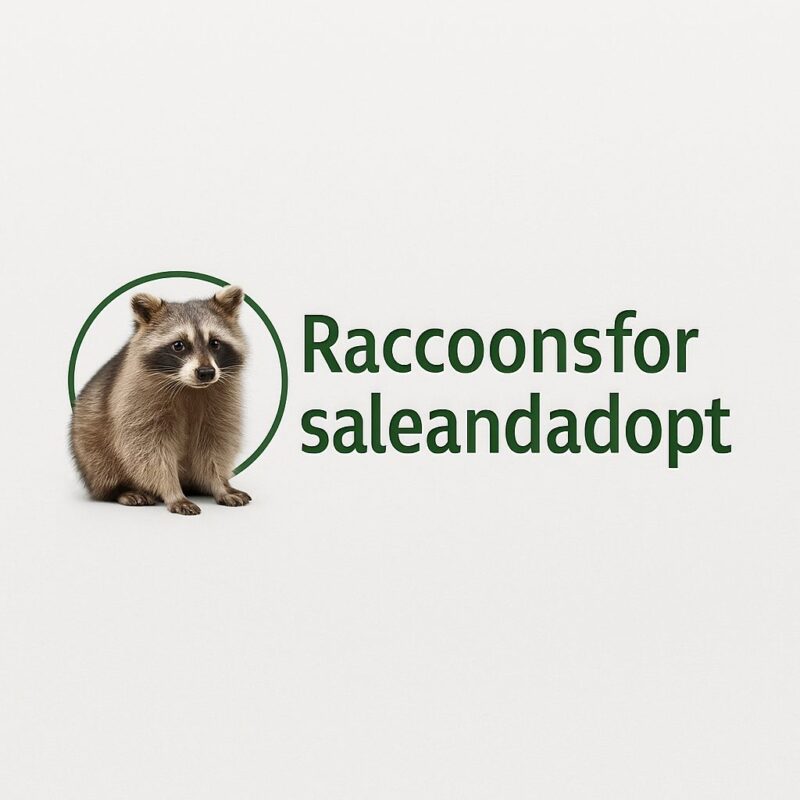Pet Raccoon Care: Everything You Need to Know Before Adopting One
Getting a pet is an exciting idea, but raccoons aren’t usually the first animals that come to mind. And for good reason—raccoons are wild, highly intelligent, and require a great deal of care and attention. They’re not your typical house pets, and they need specific environments to thrive.
Still, with the right setup and preparation, adopting a raccoon can be an incredibly rewarding experience. Below, we’ve put together essential tips, tricks, and legal considerations to help guide you on your raccoon care journey.
Thinking of Getting a Pet Raccoon? Read This First
Raccoons are curious and active animals that typically weigh between 7–20 pounds and measure 16–28 inches in length. They’re naturally nocturnal, extremely clever, and require lots of space and stimulation.
Well-Trained and Socialized Baby Pet Raccoons for Sale:
If you’re interested in adding one to your home, click the button below to view our available pet raccoon cubs for saleand find the perfect match for your family.
Is It Legal to Own a Raccoon in the US?
Raccoon ownership laws vary by state. While some states allow it under specific conditions, others prohibit it entirely.
- States where it’s legal with restrictions include:
Minnesota, South Dakota, Iowa, Nebraska, Oklahoma, Tennessee, Kentucky, South Carolina, Florida, Indiana, Ohio, Delaware, New Jersey, Vermont, Illinois, and Michigan. - Oregon & Missouri: Legal, but require permits.
- Wyoming: Raccoon ownership is legal, but importation is banned.
- Arkansas: Ownership is allowed for up to 6 weeks without a permit.
- Pennsylvania: Legal if purchased from a licensed breeder.
⚠️ Always check with your local wildlife department before adopting. Ethics matter too—raccoons are wild by nature and need proper environments and care.
Enclosure Tips: Creating a Safe, Stimulating Space
Raccoons need room to climb, explore, and play. When designing an enclosure:
- Prioritize vertical space—install climbing structures and shelves.
- Avoid using carpeted flooring or cat litter, which can injure their paws.
- Use pine pellet bedding or corn cob alternatives.
- Add enrichment items like:
- Wheels
- Swings
- Rotating toys
- Hideouts and tunnels
Switch out toys regularly to prevent boredom and encourage mental stimulation.
What Should Pet Raccoons Eat?
Raccoons are omnivores that thrive on a varied, balanced diet.
✅ Healthy Foods:
- Fruits: Apples, grapes, berries (no seeds)
- Vegetables: Carrots, cucumbers, sugar snap peas
- Protein: Chicken, fish, insects (mealworms, crickets), rabbit
- Other: Walnuts, chestnuts, roses, myrtle petals
❌ Avoid:
- Cat food – may cause kidney issues.
- High-sugar, high-sodium, and processed foods.
- High-protein dog food – use low-protein kibble only if needed.
To avoid obesity, monitor portion sizes and weigh your raccoon regularly.
Vet Visits: Keeping Your Raccoon Healthy
Find a vet experienced with exotic pets or wildlife. Routine care includes:
- Annual checkups
- Vaccinations: Rabies, Canine Distemper, Parvovirus, Feline Panleukopenia
- Parasite control: Use fenbendazole, pyrantel pamoate for worms
Flea control options: Revolution, Capstar
Mental Stimulation and Enrichment Ideas
Captive raccoons miss out on the natural stimulation of the wild. To keep them engaged:
Types of Enrichment:
- Tactile: Sensory boards, ball pits, texture fabrics, pools
- Olfactory: Herbs, safe essential oils, animal furs, new scents
- Auditory: Music, nature sounds, singing
- Visual: Mirrors, rotating toys, moving their items around
Changing the environment regularly is key to preventing stress and destructive behavior.
Understanding Raccoon Temperament
Raccoons are active, independent, and clever. They bond well if raised from a young age but can also bite, especially when threatened or anxious.
Key temperament traits:
- Nocturnal
- Climbers and chewers
- Intelligent and social (when trained)
Safety Tips:
- Avoid hanging fragile or valuable items in their space.
- Keep chew toys and climbing structures available.
- Provide cozy sleeping areas with washable bedding.
Do Raccoons Need Exercise?
Absolutely. Without daily physical activity, raccoons quickly become overweight and bored.
Good exercise options:
- Climbing spaces
- Obstacle courses
- Walking/running areas
- Interactive play sessions
Raccoon Grooming Tips
- Brushing: Helps control shedding, especially during stress.
- Bathing: Rarely needed—only with mild shampoo.
- Nail trimming: Ask your vet for help or a safe trimming schedule.
Is It Expensive to Own a Raccoon?
Yes, caring for a raccoon involves ongoing expenses:
- Monthly care: $30–$50+
- Initial purchase: $300–$700+ from a licensed breeder
- Annual vet care & emergencies: Additional costs
Always plan for unexpected expenses and check if your local vet offers exotic animal care.
Final Thoughts
Adopting a raccoon is not for everyone. It requires dedication, time, money, and knowledge. But with proper care, raccoons can live up to 20 years in captivity and form meaningful bonds with their owners.
If you’re ready for the responsibility, a raccoon can be an incredibly intelligent, fun-loving, and unique companion.
Want to Learn More About Raccoon Care?
Explore our other articles for in-depth insights and advanced raccoon parenting tips. There’s always more to learn when it comes to these fascinating, wild-hearted animals.
Have questions? [Contact us]—we’re happy to help!
